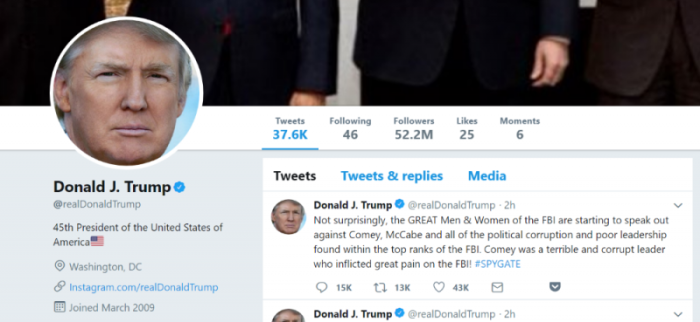Trump Can't Block Twitter Users Over Political Views, Court Rules

A federal judge has ruled that President Donald Trump's personal Twitter account cannot block people on the basis of expressed political views.
Last year, the Knight First Amendment Institute at Columbia University and a few people who were blocked on Twitter by the @realDonaldTrump account sued the Trump administration, arguing that this blocking constituted "viewpoint discrimination."
Judge Naomi Reice Buchwald of the U.S. District Court for the Southern District of New York issued the decision on Wednesday, ruling that the @realDonaldTrump account constituted a "public forum" for debate and expression, and thus was not allowed to block other accounts for engaging in political discourse.
"In so holding, we reject the defendants' contentions that the First Amendment does not apply in this case and that the President's personal First Amendment interests supersede those of plaintiffs," ruled Judge Buchwald.
Jameel Jaffer, the Knight Institute's executive director, said in a statement in support of the ruling that the court gave "a careful application of core First Amendment principles to government censorship on a new communications platform."
"The president's practice of blocking critics on Twitter is pernicious and unconstitutional, and we hope this ruling will bring it to an end," stated Jaffer.
The ruling doesn't mention other public officials but could have implications for them, Katie Fallow, a senior staff attorney with the Knight First Amendment Institute told The Washington Post.
Casey Mattox of the Charles Koch Institute posted a series of tweets in response to the ruling, noting that while the @realDonaldTrump account is technically a private account, Trump himself does not distinguish what he tweets there with what he posts on his official presidential handle.
"Govt officials are private citizens too. Trump has to be allowed to be both President and private citizen. The court acknowledges that. But unless we're going to have a strictly formal rule - the President's account is not just a personal one," wrote Mattox.
"He's doing public business on that account constantly and acknowledges as much. But as importantly to me, [White House Social Media Director and co-defendant Daniel Scavino] is a govt official whose job includes tweeting for Trump from the account. Line drawing will be critical in the future. But this is practically a govt account."
While Mattox wasn't convinced that the court made the right decision, he acknowledged that the freedom of speech issues in the case are "more complicated and nuanced than many have appreciated." He also agreed with the court that an easy solution would be for Trump to use the mute function instead of the block function, which would allow comments below Trump's tweets but not require that Trump see the comments.
Last July, the Knight Institute and a group of people blocked by Trump's account filed suit, charging that Trump was violated their First Amendment rights.
Last November, Georgetown Law School's Institute for Constitutional Advocacy and Protection filed an amicus brief in support of the plaintiffs,
"By opening the @realDonaldTrump Twitter feed to the general public, utilizing Twitter's speech-enhancing features, and engaging in a robust back-and-forth with commenters, defendants have demonstrated their intent to designate the feed as a public forum," read the brief.
"Defendants therefore violated plaintiffs' First Amendment rights by blocking them from following and replying to @realDonaldTrump because of their criticism of the President and his policies."
For their part, the administration argued in a brief filed last October that the @realDonaldTrump account does not fit the definition of a public forum.
"The President uses the account for his speech, not as a forum for the private speech of others. And his decision to block certain users allows him to choose the information he consumes and the individuals with whom he interacts — expressive choices that public officials retain the right to make, even when those choices are made on the basis of viewpoint," said the government.
"The President had no role in structuring the conversations among Twitter users, let alone an intent to create a forum for private expression."




























